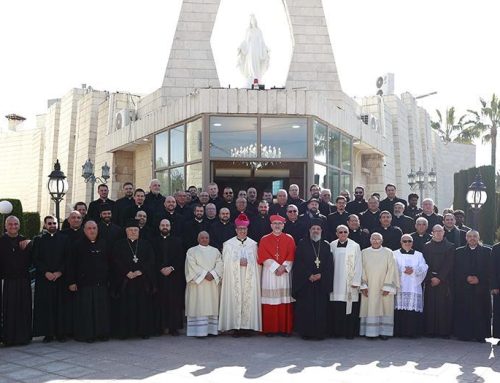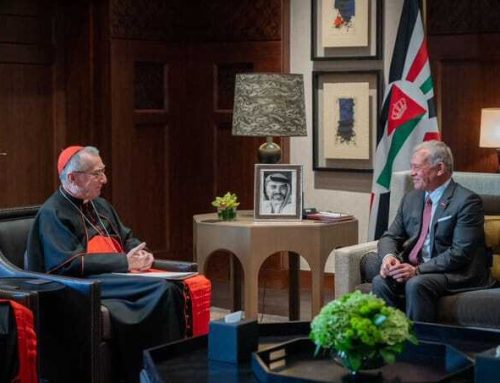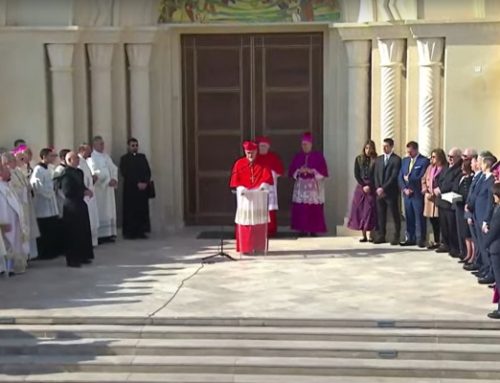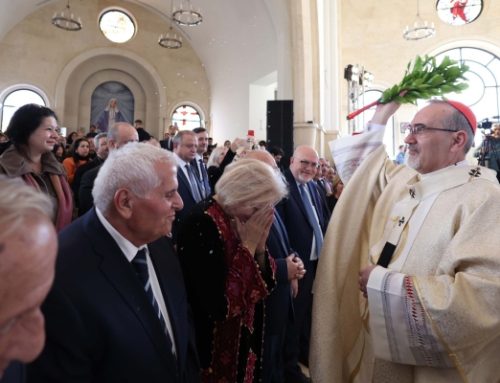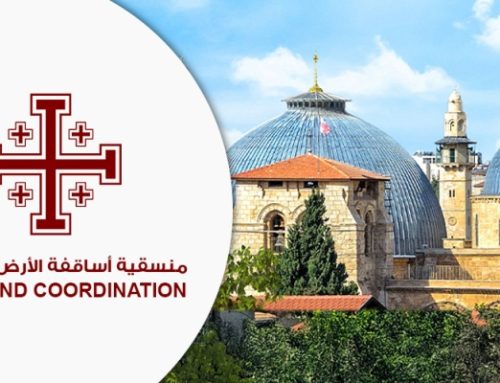On Sunday, Sept. 17, after some churches were attacked in the West Bank, four Jerusalem heads of local churches here went to Nablus to stand in solidarity with Christian sisters and brothers there.
On Sunday, Sept. 17, after some churches were attacked in the West Bank, four Jerusalem heads of local churches here went to Nablus to stand in solidarity with Christian sisters and brothers there. His Beatitude Latin Patriarch Michel Sabbah; Bishop Riah Abu el-Assal of the Episcopal Church of Jerusalem and the Middle East; Bishop George Bakar, the Greek Catholic Exarch and I viewed the minimal damage mostly on the outside of the four churches. More serious, however, was the symbolic meaning of the acts. Bishop Riah and I worshipped and con-celebrated at the Anglican Church there, and His Beatitude and Bishop Bakar worshipped and con-celebrated together in the Roman Catholic Church. Our aim was to encourage all of the people, Christians and Muslims, and to discuss events with congregations and officials in Nablus, including all of the political factions. I reminded them of the verse from Luke 12:32: “Have no fear, little flock.”
We all – Christian and Muslim leaders and government officials of all factions – denounced the violence that has occurred. At the same time, we asked if the relationship between Palestinian Christians and Palestinian Muslims was so shallow that a statement from thousands of miles away should spark such actions. We know the answer – for the majority of us – is no. We concluded that these are the acts of a few irresponsible people who do not represent Islam or Palestine. These are extremists trying to drive a wedge between Palestinians – Christians and Muslims – and somehow disrupt the long history of co-existence we have enjoyed until recently, when political disputes are being made into religious ones.
According to Father Awad, the Roman Catholic leader in Nablus, “the goal of these actions is to create a rift among the peoples who have lived for hundreds of years with love and tolerance.” Bishop Alexus, Bishop of the Arab Orthodox community in Gaza, echoed this sentiment: “We live together as one family.”
We cannot allow these irresponsible few to hold the many of us hostage to extremism and fear and to turn us against one another. Nor can we allow this to distract us from the urgent issues of justice that we face together. Christian and Muslim religious leaders here have fully denounced violence – whoever the perpetrator – and stand together against it.
The Mufti General of Palestine, Sheikh Muhammad Hussain, as well as Chief Islamic Judge Sheikh Tayseer At-Tamimi and spokesmen for Hamas have denounced the attacks.
“We are a people of Muslims and Christians who live together, feel each other’s hopes and pains, and so we have to be united and wise towards every insult on our religious symbols,” the Mufti said.
These acts call us to higher ground. We cannot respond with extremism and stereotype an entire religion from the acts of a few. Instead, let us follow the path of Jesus, who lived with openness, tolerance and respect while standing firm against violence and hatred. Let us banish fear and anger from our hearts and continue to serve everyone, regardless of their politics, religion or ethnicity, as equal children of God worthy of love and respect. This strengthens our civil society and is the fabric of our Body of Christ.
Even if an incident takes place, our responses must be wise, measured and strategic. The Pope’s comments were understood to be unnecessarily provocative and offensive, and they were not helpful to either Christians or Muslims here. However, we must find other ways to express that. We must confront conflicts in dialogue at their roots and not let them fester or tempt us into violence. This is the only path to deepen our ability to live together as Christian and Muslim neighbors.
We are aware that some elements are trying to portray Islam as a negative, violent religion. Most of us Palestinian Christians do not agree. The Islam with which we have lived all our lives has given us peaceful, good neighbors within Palestine. This is why I question those elements who did this: “Why are you trying to strengthen those who label you?”
In Tubas, a village near Jenin where someone tried to burn a church, local Muslims stopped him. Then a delegation visited the church to express their solidarity within their town between Muslims and Christians. Tubas Mayor Oqab Daraghma said that the person who attempted this act was probably “ignorant” because this town has a “fraternal relationship” between Christians and Muslims.
As His Beatitude said, “we need Muslims and Christians to continue to be partners for finding common values that can build the globalized new world order.” Our urgent call in this fragile time and place is to join together as Muslims, Christians and Jews to promote justice, peace, forgiveness and reconciliation which are the only foundations of a civilized world. And at the same time, we must stand firm against dehumanization, stigmatization, stereotyping and demonization, which only foster anti-Semitism, Islamophobia, xenophobia and all targeted hatred.
If you ask me what do I think of what happened, I will continue to say there is no systematic persecution of Christians in Palestine or the PA. These kinds of incidents between Muslim and Christian are so rare that I can remember each one over my 30 years in ministry here. That’s why it was so good for me to go from these problems in Nablus to a wedding in our Lutheran Church of Hope in Ramallah, where 700 Christians and Muslims danced and celebrated together. That is what we do and how we live. No police, no security, no need for such things. We are, in the end, all Palestinian sisters and brothers.
So I say to you few who did these acts, “May God forgive you, for you don’t know what you are doing.”
I again call on Christian and Muslim leaders to sign a code of conduct that promotes respecting one another’s sacred writings, symbols and places and fosters religious pluralism, mutual respect and co-existence.

